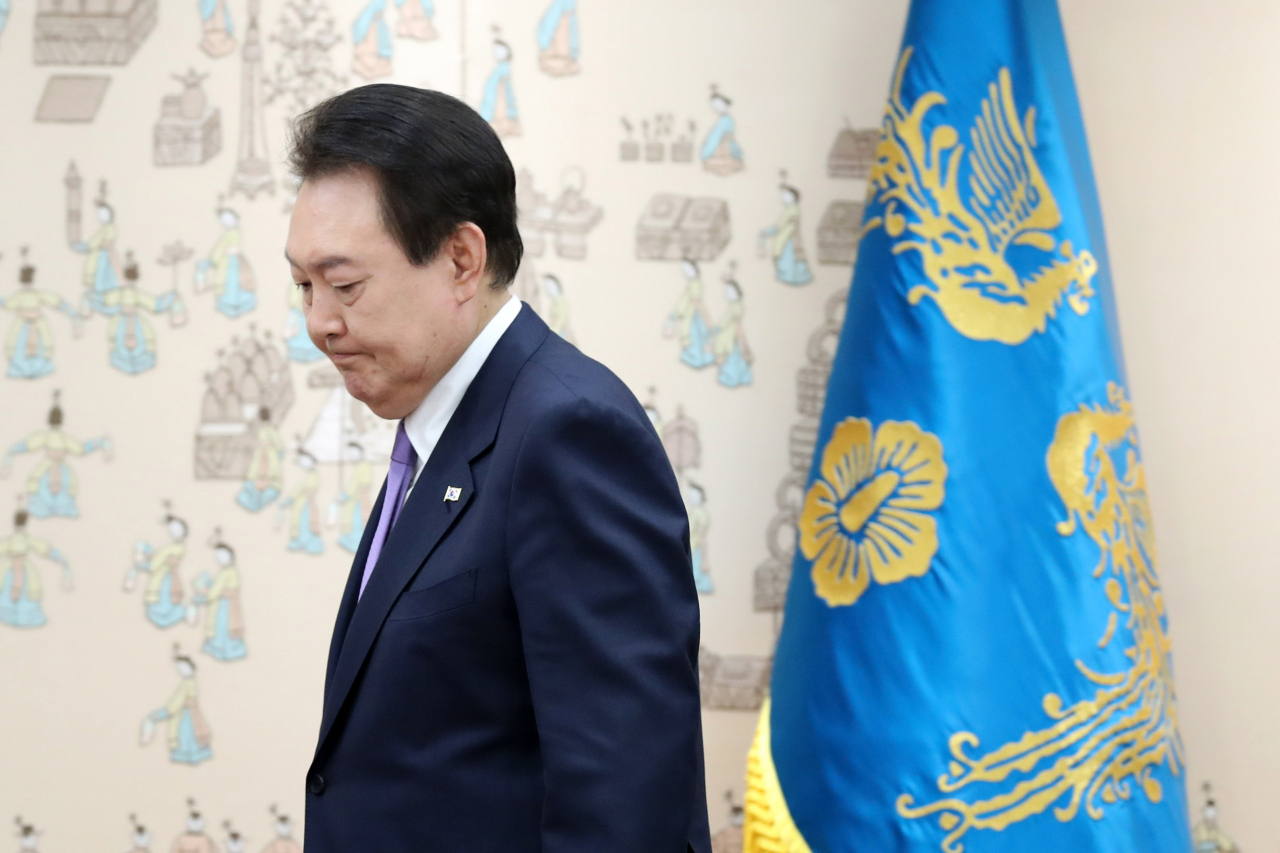 |
President Yoon Suk Yeol (Yonhap) |
The presidential office said Monday it would request "appropriate measures" from the US if necessary after the two countries finish assessing allegations that the US intelligence agency had wiretapped the South Korean government.
The US reports that brought the spying allegations to light are "not confirmed fact," a senior official from the presidential office told reporters, stressing that fact-checking must come first. It is also difficult to rule out the possibility that information in the reports could have been fabricated by a third-party force, he said pointing out that most of the information is about Russia's war in Ukraine.
He also dismissed the opposition’s claim that the presidential office has security issues, saying that the security of the National Security Council is more solid in Yongsan than in former presidential compound Cheong Wa Dae. “The bunker structure at Cheong Wa Dae juts out slightly aboveground, so the security where the president works here is safer.”
The presidential office was responding to the opposition party's claim that the relocation of the presidential office to Yongsan has left the presidential office defenseless against wiretapping.
The opposition party also urged the president to bring up the spying allegations suggested by a leak of what appears to be classified Pentagon documents at the upcoming summit with his US counterpart.
One of the leaked classified US documents, the authenticity of which has not yet been verified, showed details of private conversations between two top South Korean officials about the US push for Seoul to supply lethal weapons to Ukraine.
In a joint statement, Democratic Party of Korea lawmakers on the National Assembly’s national defense and foreign affairs committees characterized the alleged spying as a "US violation of South Korea’s national sovereignty” and “illegal espionage activities.”
“It is regrettable that before the head of state's visit to the US, such an event has transpired,” said Democratic Party Rep. Kim Byung-joo in a press conference.
“We strongly urge that the presidential office take steps to ensure there is no recurrence,” he said, calling Yoon’s official response to the leak “lenient.”
“I don’t know what he is afraid of, but the presidential office ought to be asking for an apology.”
Democratic Party Rep. Kim Eui-kyeom, who was previously spokesperson for the Moon Jae-in presidential office, argued that based on what is revealed so far he believed it was a “very intentional and premeditated act of eavesdropping.”
“I don’t think it was the phones that were being wiretapped. I think it was somewhere in the presidential office, some conference room perhaps, that had been accessed,” he said in the same press conference.
He added that Yoon should add discussion of the alleged spying to the agenda at his summit with Biden.“President Yoon, as the leader of a sovereign country, should convey a strong, clear protest,” he said.
Rep. Youn Kun-young, who was the director of state affairs planning and monitoring for Moon, said the leak revealed “a significant loophole in national security.”
He claimed that Yoon relocating his office out of Cheong Wa Dae “likely allowed the presidential office, the center of power and national security, to be spied on.”
“The national security council meetings are said to have been exposed,” he said, arguing that “the very front lines of the country’s national security” appear to be lacking counter-espionage infrastructure as a result of the relocation.
Democratic Party Rep. Lee Jae-jung pointed out that the presidential office neighbors the US military base, and that its proximity possibly made it vulnerable.
Democratic Party chief spokesperson Rep. Kwon Chil-seung said the spying, if true, is an “act that severely undermines the trust upon which South Korea-US alliance is based.”
Ruling People Power Party lawmakers called for caution as an investigation is being undertaken into the leak.
Rep. Kim Tae-ho, the head of the National Assembly foreign affairs committee, said in a statement that while the US investigates the leak, it “should not lead to divisions among liberal democratic allies.”
Rep. Tae Yong-ho, on the assembly’s foreign affairs committee, warned against “rushing to conclusions.”
“We have to consider the possibility that Russia, which is at war with Ukraine, might have spread false information,” he said.
“The countries that would benefit from weakened ties between South Korea and the US are none other than North Korea, China and Russia.”







![[Today’s K-pop] Blackpink’s Jennie, Lisa invited to Coachella as solo acts](http://res.heraldm.com/phpwas/restmb_idxmake.php?idx=644&simg=/content/image/2024/11/21/20241121050099_0.jpg)